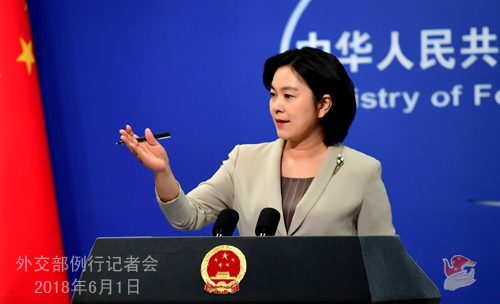
Q: According to reports, the US Department of Commerce announced that it would impose a 25% tariff on steel imports and 10% on aluminum imports from the European Union (EU), Canada, and Mexico as of June 1, which has aroused strong criticism from the relevant parties. President of the European Commission Jean-Claude Juncker said that this is protectionism, pure and simple and it is totally unacceptable that a country is imposing unilateral measures when it comes to world trade. The EU will soon respond with countermeasures. French President Emmanuel Macron said the decision made by the US side is illegal and wrong. German Finance Minister Olaf Scholz said that they would make a strong response. Canadian Prime Minister Justin Trudeau said that this move is totally unacceptable. Mexico also announced its countermeasures. What is your comment?
A: The information mentioned by you has drawn great attention from all relevant parties. Now the international landscape is undergoing unprecedented profound changes. Hot-spot and thorny issues keep cropping up and unilateralism and protectionism are on the rise. When we face a lot of uncertainties and destabilizing factors in today's world, the responsible countries should roll out responsible policies, take responsible actions, and make concerted efforts to inject positive energy into the world and promote global stability.
With regard to the economic and trade issues, indeed, many countries are concerned about the US' unilateralism and protectionism. We always believe that against the backdrop of the in-depth development of economic globalization and the increasingly intertwined interests of all countries, "beggar-thy-neighbor" and "indiscriminate shelling" are by no means helpful and effective ways to resolve problems, nor are they constructive. All countries, especially the major economies, should resolutely oppose trade and investment protectionism in all manifestations, uphold the fair, open and rules-based multilateral trading system with the WTO at its core, maintain the normal international trade order and fuel the sustained recovery and growth of the world economy. We are willing to join hands with the relevant countries to continue to uphold multilateralism and international rules, advance the process of economic globalization and build an open world economy.
Q: China and Sri Lanka are reportedly involved in talks to sign a free trade deal. But a senior Sri Lanka trade negotiator said that the talks have reached a stalemate at the moment, as Sri Lanka is worried that Chinese investment may make it indebted. I am aware that this question is for the Commerce Ministry to answer. Maybe you can give us some comments about this?
A: I am not aware of the specifics you mentioned, and I will refer you to the Ministry of Commerce.
As a principle, China and Sri Lanka are strategic cooperative partners, and we have lent sincere support to each other as always. In light of Sri Lanka's needs, China provides assistance to the best of its ability to help Sri Lanka close financing gap, boost economic development, improve people's livelihood and enhance its self-development capability. This has been applauded by the Sri Lankan government and people. China attaches importance to its friendly cooperative relations with Sri Lanka and is willing to continue to conduct cooperation in economic, trade and other areas with it in the spirit of equality and mutual benefit. We stand ready to play a constructive role in helping Sri Lanka follow the path of sustainable development and diversify its economy.
Q: According to reports, the US Department of State said recently that the country's visa policy for Chinese citizens remains unchanged and the maximum amount of time given to Chinese student-visa holders is still five years. The review process for applicants with regard to sensitive majors will not change and it doesn't target Chinese citizens. The Department of State also stressed that the US welcomes more Chinese citizens for a visit. How do you comment on that?
A: We have noted relevant reports and welcome the clarification by the US. Like we said previously, people-to-people exchanges serve as a basis for exchanges and cooperation in various fields between China and the US. The facilitation of visa application is reciprocal and mutually beneficial, which serves the common interests of our two peoples. Both sides should take more proactive measures to further facilitate people-to-people exchanges and create more enabling conditions for across-the-board exchanges and cooperation between our two countries.
Q: I know I should also raise this question to the Ministry of Commerce. It is reported that US Commerce Secretary Wilbur Ross is supposed to be arriving in Beijing tomorrow. Do you have any details on this? Is he coming or is he not coming?
A: Yesterday, the spokesperson of the Commerce Ministry said that the US team composed of about 50 members has engaged in consultations with the Chinese team on how to follow through on the consensus in our joint statement in Beijing. As to whether Secretary Ross is coming or not and when he is coming, I may refer you to the Commerce Ministry for details.
We have said that China's door for negotiation remains open. With regard to the issues in China-US economic relations and trade, our two sides should adopt a sincere attitude and follow the spirit of equality and mutual respect to seek a win-win solution through dialogue and consultation.
Q: According to reports, on May 31, Carlo Cottarelli, the Prime Minister-designate of the Italian caretaker government returned to President Sergio Mattarella his mandate to form a cabinet. Giuseppe Conte was reappointed as the Prime Minister and he has submitted the name list of the new cabinet to the President. The new government will be sworn in today. What is your comment on the latest development in the Italian political situation?
A: We have noted relevant information. Italy is an important member of the European Union. China and Italy are traditional friendly countries as well as comprehensive strategic partners. China is pleased to see that Italy can uphold political and social stability and maintain economic development and prosperity. Currently, the China-Italy ties enjoy a sound momentum of development. China stands ready to work with the new Italian government to stay committed to consolidating political mutual trust, expanding practical cooperation across the board and moving forward China-Italy relations.

Q: Swaziland is now the last country on the African continent to have the so-called "diplomatic relations" with Taiwan. Do you have any particular message for Swaziland? Do you have any advice for them?
A: We have been sending out very clear message in recent days. The one-China principle corresponds with the trend of the times and meets the shared aspirations of the people. As you can see, more and more countries have developed across-the-board friendly cooperative relations with China on the basis of the one-China principle and achieved tangible progress. Swaziland is surely welcome to join the big family of China-Africa cooperation at an early date so that we can take a group photo of the whole family of China-Africa cooperation. Indeed, this all depends on Swaziland itself.
Q: As the China-Japan-ROK leaders' meeting just ended early last month, a series of senior officials' meetings on East Asia cooperation will be held in Singapore next week. Does China have any expectations for China's participation in East Asia cooperation?
A: East Asia cooperation is now flourishing, for which the regional cooperation mechanism with ASEAN at its core has played an important role.
China highly values ASEAN's role and China-ASEAN relations. Last month, when visiting the ASEAN Secretariat, Premier Li Keqiang said that China is committed to be ASEAN's partner for common development, peace, openness and win-win progress, entrepreneurship and innovation and inclusiveness and mutual learning, which pointed out the direction for our bilateral relations. As this year marks the 15th anniversary of the China-ASEAN strategic partnership and the China-ASEAN Year of Innovation, our bilateral relations now stand at a new starting point. China and ASEAN will continue to deepen our cooperation regarding the three pillars, namely, political security, economy and social and people-to-people exchanges, and make new contributions to regional peace, stability and development.
The ASEAN plus Three (APT) cooperation is the main channel for East Asia cooperation. China has always actively engaged in the APT cooperation and hosted a series of projects in such areas as finance, agriculture, youth development and education. The Training Program on Understanding China has been held for the 7th consecutive year, which is of positive significance in enhancing the understanding of China's political, economic, social and cultural conditions by the young officials from ASEAN countries. Last month, the 7th China-Japan-ROK leaders' meeting was successfully held in Japan, after which China took over the presidency of the China-Japan-ROK cooperation and the APT cooperation. We are willing to conduct closer coordination with various parties to reach the Regional Comprehensive Economic Partnership agreement at an early date and jointly promote the development of East Asia Economic Community.
Q: According to reports, Russian Foreign Minister Sergei Lavrov, when meeting with the DPRK supreme leader Kim Jong Un, said that Russia fully supports the DPRK-US summit which has been put on the agenda as well as the DPRK's resolve in and position on striving for the denuclearization of the Korean Peninsula. Reports say that the two sides exchanged views on the Korean Peninsula situation and reached consensus on holding the DPRK-Russia summit. How does China look at the role played by Russia in denuclearization and regional peace and stability?
A: China noted that Foreign Minister Sergei Lavrov has just visited the DPRK, during which he met with Chairman Kim Jong Un and held talks with his counterpart Ri Yong Ho. The DPRK reiterated its position on denuclearization and highlighted that its will in the denuclearization of the Peninsula remains unchanged, consistent and firm. The Russian side said that it supports the peace process of the Peninsula and welcomes the interactions between the DPRK and ROK as well as between the DPRK and the US. China believes that the message sent out by the DPRK and Russia is positive and China welcomes it.
Russia is a close neighbor to the Korean Peninsula and a member of the Six-Party Talks. It has been committed to upholding the peace and stability of the Peninsula and promoting the settlement of the Korean Peninsula issue through political and diplomatic means. China welcomes Russia's positive role in advancing the denuclearization of the Peninsula and promoting the political settlement process of the Peninsula issue.
China welcomes the development of bilateral ties and the enhancement of high-level exchanges on the part of the DPRK and Russia. We believe that this is conducive to promoting the political settlement process of Korean Peninsula issue and upholding the peace and stability of the Peninsula and the Northeast Asia.
Q: What does China make of yesterday's comments by Pentagon Marine Corps Lieutenant General McKenzie that it is a core competence of the US Navy to capture small islands? He was talking about America's experience in the Second World War.
A: As to the recent remarks on the South China Sea made by certain people from the US military, I already stated China's consistent position on the issue in my reply yesterday.
I won't comment on each and every specific extreme remark made by the relevant person from the US military. I would like to reiterate that there is now a momentum for stability and improvement in the South China Sea. China and the ASEAN countries, those littoral countries in particular, all have the shared aspiration or firm consensus that all parties should work hard to uphold peace and stability in the South China Sea so that countries in this region will enjoy development and prosperity. We will continue to make positive efforts to this end. We hope the US will play a constructive and responsible role in this regard rather than stir up troubles. The US should uphold rather than undermine regional peace and stability.


